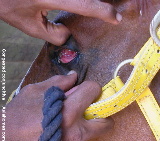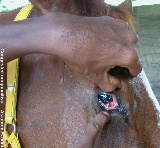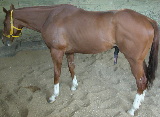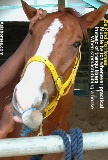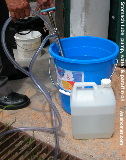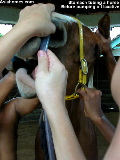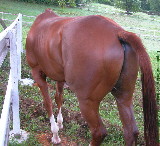| 0716Singapore
horse colic pet health and welfare educational for animal lovers, excerpts from The Glamorous Vets,
Singapore, sponsored by AsiaHomes Internet.
May 26, 2002 You can bring the horse to the water but you can't make it drink "The veterinarian gave my horse three stomach-tubings in one day," said Mrs Fry. "He was having so much pain, rolling and kicking even after the first procedure. That was why he was given two more tubings. After that he took about a week to recover and had no colic for the past three years." "Three stomach-tubings within 24 hours?" I asked incredulously. This was the first time I had heard of multiple tubings within twenty four hours. Each horse colic case is unique and there is no fixed rule that the oil laxative must be given only once in 24 hours, although I believe that would be what most horse veterinarians practise all over the world.  Now,
on this May Day, a day of rest for worker, a public holiday, Mrs Fry's horse had been
lying down for the past 4 hours. "I was shocked to see his head outside the lower bar
at the entrance to his stable early this morning!" said the syce (stablehand). Now,
on this May Day, a day of rest for worker, a public holiday, Mrs Fry's horse had been
lying down for the past 4 hours. "I was shocked to see his head outside the lower bar
at the entrance to his stable early this morning!" said the syce (stablehand).The stable manager had phoned me to check the horse which was having great difficulty passing urine. It was now noon, a bright blazing sun reflecting dazzling light off the tarred road. The horse was lying down more frequently. Flat out on one side. Just wanted to sleep. Mrs Fry had not exercised him for the past two days. Was he suffering from exercise withdrawal if there was such a condition in equine medicine? Or a mild case of being tied up, suffering from back muscle cramps when he was not exercised? He was not lame but just wanted to roll over and rest. He did not drink the usual amount and had little appetite today. He had not passed stools. In horse medicine, we are obsessed with whether the horse had passed stools when it does not feel well. This chestnut horse was big but gentle. He quickly got up when he saw me, as if he knew I was going to inject him. I gave him a pail of water. He had a sip, rinsed his mouth and spat out the water at me. I was surprised as the few thousand racing horses I used to treat for eight years at a turf club had never spat at me. Mrs Fry later confirmed that her horse had this habit and had probably learnt from the neighbouring riding horses. The horse's rectal temperature was 38.5C, a half degree higher than his normal temperature. His breathing and pulse rates were normal. I put my ears onto his belly on the left and right sides. His abdomen or belly looked moderately distended, like a balloon. He did not object. I could not hear intestinal sounds. This was a bad omen. I gave him an anti-spasm pain killer and antibiotic. Most horses would urinate within fifteen minutes. This horse tried. His penis was extended for a while but no urine came out. He retracted his penis as if he did not like some two-legged human beings watching him do his private business. Mrs Fry arrived and took him for a walk in the lunging ring. He did pass water around one hour later, she phoned me. 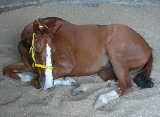 Then
all he wanted to do was to lie down when other horses would be standing two hours after
injections. He was not in severe thrashing pain like a colicky horse. However,
the dysuria or difficulty in passing urine was a bad sign. This would mean that the
constipated stools in the large intestine had weighed heavily onto the bladder outlet. I
told Mrs Fry that the horse had to be given the paraffin oil by stomach-tube. Then
all he wanted to do was to lie down when other horses would be standing two hours after
injections. He was not in severe thrashing pain like a colicky horse. However,
the dysuria or difficulty in passing urine was a bad sign. This would mean that the
constipated stools in the large intestine had weighed heavily onto the bladder outlet. I
told Mrs Fry that the horse had to be given the paraffin oil by stomach-tube."Is it necessary to stomach tube my horse?" Mrs Fry asked recalling the past suffering. I said yes. From the great difficulty in passing water, the large colon must have been filled with a large amount of constipated stools which had pressed onto the bladder. It would be very expensive to X-ray the abdomen of a big horse and interpretation of clinical signs would be paramount. For a dog and cat, it would be just too easy to palpate or feel the hard faecal lumps inside the abdomen, but for a horse, its few hundred feet of intestines could not be palpated. My stethoscope could not detect much intestinal sounds and this was a sign that the intestines have stopped moving the digested matters, probably due to the presence of an impacted dry mass of stools. The stable manager, helped me to give this gentle horse a oil laxative at 2.30 p.m. He held the horse's ears while the stablehand restrain the horse with a nose twitch. I passed the stomach tube in at the first time. I passed one end of the tube to the hands-on stable manager, to confirm that he could also hear the bubbling musical stomach sounds. He was satisfied. I passed the tube further towards the stomach and listened again. This time there was dead silence from the other end of the tube. No breathing sounds to indicate that the tube had gone to the lungs. Just the sound of silence. Should I commence pumping the water and oil? Better not. I pulled out the stomach tube. There was water lodged inside part of the tube and that was why I could not hear the sounds. The horse must have withheld some water he drank just now, probably to spit at me later. The water must have flowed into the stomach tube. Well, this was not anticipated. It took me four trials before I could get the tube into the stomach. The theory was easy. The practice of gently inserting the stomach tube without causing tears or perforations of the gullet was not that easy. I told Mrs Fry that it would take at least 24 hours for the stools to be passed out. Her horse might freak out in pain and she was to be prepared for it. It was easier said than done. A horse with stomach colicky pain was ever so distressful for any owner. At 9.30 p.m, Ms Glynn, a teenager helping Mrs Fry to look after her horse phoned me. The horse had been kicking and breathing heavily, as if he was going to die for the past three hours. It had rolled and was down now. He was walked to distract him from lying down. When I arrived, the horse had just passed five lumps of hard stools. No oil had been passed yet and this was already seven hours after being stomach tubed. This was a bad constipation. The horse was just interested in eating the grass at the fringe of the stable road. Not interested in water. What should we do? Can we force feed him with water? Should he be allowed to eat grass in the first place as he was constipated and more food would aggravate the condition? He was the type of horse who would nibble grass the whole day, Mrs Fry had told me. Green cow grass common in Singapore was just like candy to him. "Why not pluck the grass, put them into a pail filled with water and let him eat and drink at the same time?" I asked Ms Glynn. The horse was put inside the rolling box with a large pail of water and floating grass. Ms Glynn, an athletic and strong girl, the gymnastic type, was totally shagged, having got up at five in the morning to go to school and now she just could not stand up. It would be a long walk past a dark lane to get to the main road and she had to go home now. She was a girl who loved horses and had spent so much time caring for this horse belonging to somebody, without asking for money. I told her to wait as I would give her a lift home. The horse was keen on the grass but finding it such a hassle, he just looked at us and stopping putting his mouth into the pail of water as he could not separate the grass from the water. He must have thought that we were full of trickery and had no respect for his intelligence. Yes, we could bring a horse to the water but we could not make him drink. I remember so many Singapore parents bring their children for private tuition, paying as much as five hundred dollars a month. But they could not make the children study and get the top grades. It was an exercise in futility, just as in this horse. He would need to drink to prevent dehydration and constipation. But he would not do so. Mrs Fry and her friends and children were present. What more could a veterinarian do? Another stomach tubing? I said it was not necessary as the colicky pains of the horse were due to the oil passing through the over one hundred feet of horse gut. It was possible that part of the horse intestine was twisted or strangulated and surgery would be needed. Now, surgery of the intestines in the horse is a big operation just like in people and the cost would be prohibitive. There was no guarantee that the horse would survive. "I did not bring my tent to camp here," Mrs Fry said as she thought of being close to help the horse if he was "cast", namely being upside down and unable to get up by himself in the horseman's language. A colicky horse can cause sleepless nights as much worry as a fevered toddler. Both can't talk and describe their pain. I gave the horse the anti-colic injections, the antibiotics and the pain killers. He looked all right again as he stood up and was wondering what was all the fuss about with five people hanging around the rolling box as a fine mist of dew settled on all of us. It was nearly midnight and there was nothing to be done, I told Mrs Fry and her children to go home. At 9 a.m the next day, the horse was looking good. He came to me from the far end of the paddock, expecting some carrots. Oil had been passed out. He was the normal looking horse. I felt a sense of happiness that such a magnificent animal had survived what I tentatively diagnosed as a twisted gut. I had expected part of its gut to be strangulated and there would be no treatment, except surgery. 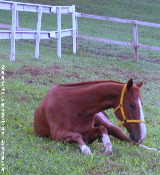 The
horse went back to the far end of the paddock. It suddenly laid down on its chest onto the
dew-moistened grass. The other four horses in the paddocks were all standing and enjoying
the morning coolness. This was not a good sign as normal horses don't lie down so
early in the day. He got up within a minute. Well, nothing to worry about, I
thought. He must be all right now. The
horse went back to the far end of the paddock. It suddenly laid down on its chest onto the
dew-moistened grass. The other four horses in the paddocks were all standing and enjoying
the morning coolness. This was not a good sign as normal horses don't lie down so
early in the day. He got up within a minute. Well, nothing to worry about, I
thought. He must be all right now.At noon time, the stable manager phoned to say that the horse was lying down again. As most veterinarians would testify, the patient always look normal when seen. The horse was standing and looking at me when I arrived. Should I stomach tube him again? He had passed stools. He just would not eat. That was the complaint for the next 2 days. I stomach tubed him but this time, he closed his common opening of the air way and gullet so that my tube could not pass through. I gave him the same injections he had last night. It took him 4 days to recover. Most horses took one or two days. His constipation was severe. He did not drink much and this would cause his stools to harden. There was no way of making a horse drink. Singapore had one of its hottest and most humid Aprils with daily temperatures exceeding 35 degrees Celcius and the horse should drink more but this horse did not do so. The grass paddocks do not have rivers or ponds, so the source of water would be the pails. This was an unusual horse who played with water and spat them out at the owner who loved him very much. He survived because he was watched over by so many people who cared about him. I just hope he would not have another episode of intestinal ileus as his case was about the worst of the lot. |
